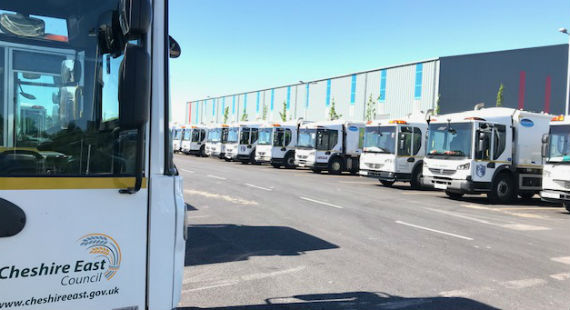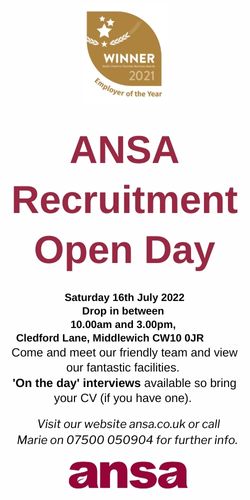
A scheme to fuel Cheshire East bin lorries with hydrogen could soon help residents breathe cleaner air, writes Stephen Topping.
Emissions from the fleet belonging to Ansa, the Cheshire East Council-owned waste management company, had soared since it relocated to Cledford Lane two years ago.
But the council – which hopes to be carbon-free by 2025 – has now secured funding towards a £1 million scheme that will see the Cledford Lane depot become home to the north west’s first green hydrogen fuelling facility.
It means Ansa will produce its own hydrogen fuel on-site to use on lorries which have been converted for it – with the clean energy source only emitting water from the tailpipe.
Cllr Jonathan Parry, Labour CEC member for Middlewich, said: “In my eyes it sounds like a really good scheme because it is clean energy.
“I am going to back it 100 per cent because the air quality in Middlewich is absolutely shocking, we need to cut down on harmful pollution.
“We have got air quality management areas in Middlewich but it has not been brought down, so at least this is Ansa doing a positive thing.”
Levels of the harmful nitrous dioxide gas – emitted by diesel-powered vehicles – have breached target levels at a number of air quality management areas around the borough, including Nantwich.
CEC has committed to improving air quality in those areas.
Working with renewable energy firm Storengy, the council says hydrogen will be produced in the greenest way possible – using an electrolyser connected to solar panels and grey-water recycling.
This will provide safe, clean hydrogen fuel, which will be pumped into dual-fuel bin wagons.
Two council-owned bin lorries will be converted at first, along with one Storengy vehicle, reducing diesel use by more than 10,000 litres a year.
“This scheme is an exciting step towards the council becoming carbon neutral by 2025,” added Cllr Nick Mannion, cabinet member for environment and regeneration at CEC.
“Building a cleaner, greener economy will not only reduce carbon but also create jobs across the borough through new and innovative technologies, such as hydrogen.
“Hydrogen is ideal as an alternative to diesel for our refuse vehicles.
“These wagons have heavy schedules when delivering their services across the borough and this type of refuelling will ensure they have the cleaner power they need when emptying our residents’ bins.”
Cllr Quentin Abel, the council’s climate change champion, added: “Policymakers and industry widely acknowledge that to achieve a zero-carbon economy we need to use fuels like hydrogen as a green energy source.
“This scheme means we can take that first step, starting with our heavy-duty vehicles. This will help towards combating the increasing climate change crisis.”
The scheme has been funded by both public and private sector investment – including £345,000 from the local enterprise partnership’s Local Growth Fund.
CEC hopes to have the facility up and running in the autumn, subject to planning permission.





















Cracking scheme. Hydrogen isn’t always from green sources – it can be manufactured from fossil fuel sources, but this scheme uses solar electricity to split water. Great way to harness the power of the sun to drive our community recycling services.
Keele Uni is using an electrolyser to generate hydrogen to heat homes and lecture theatres in a project called HyDeploy. It’s a first for the UK and is helping to change energy policy. Heating is a big challenge, but one we have to tackle – and fast.
In Germany when wind turbines generate excess electriciy Greenpeace Energy is using it to generate hydrogen, which is then stored and used to generate electricity when the wind is underperforming. It’s all about balance.
In Orkney they are generating hydrogen from wind power and using it to power the island’s ferries.
Fascinating stuff going on. Well done Cheshire East.